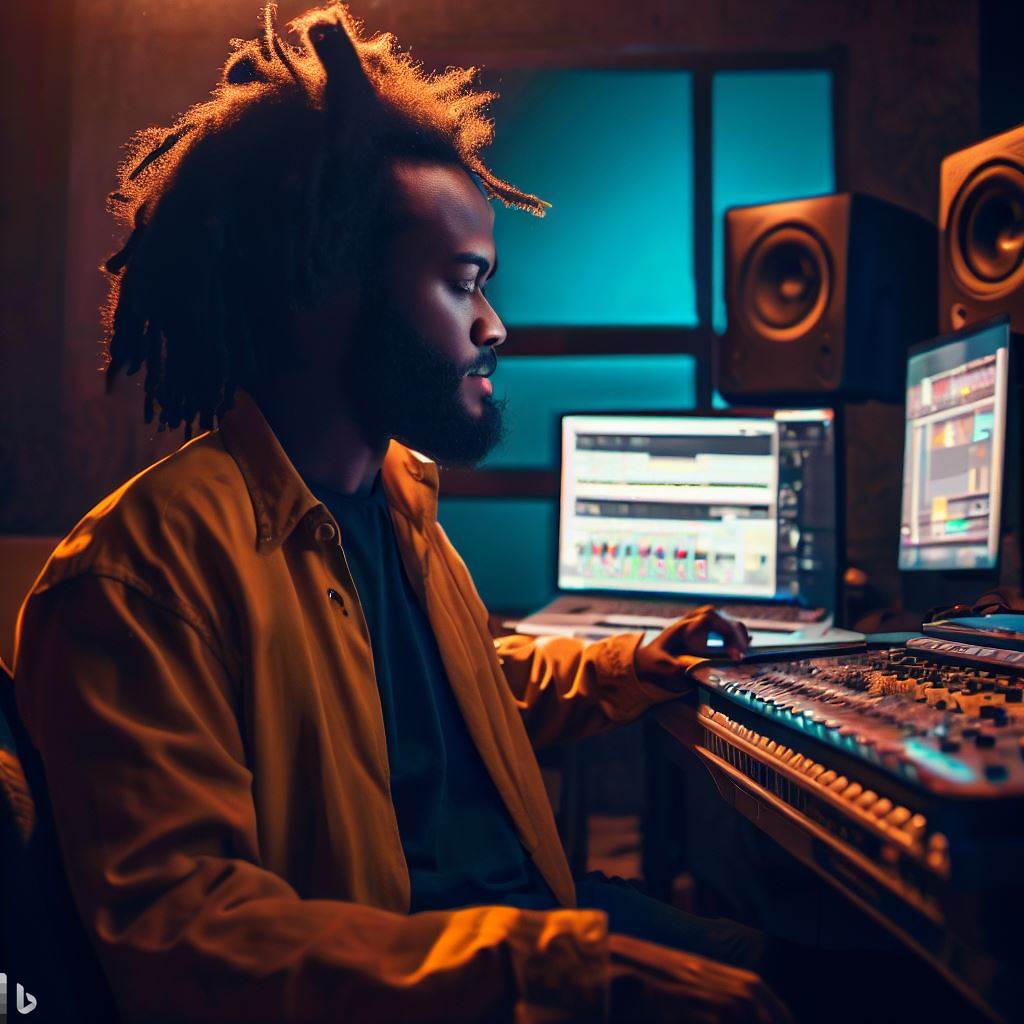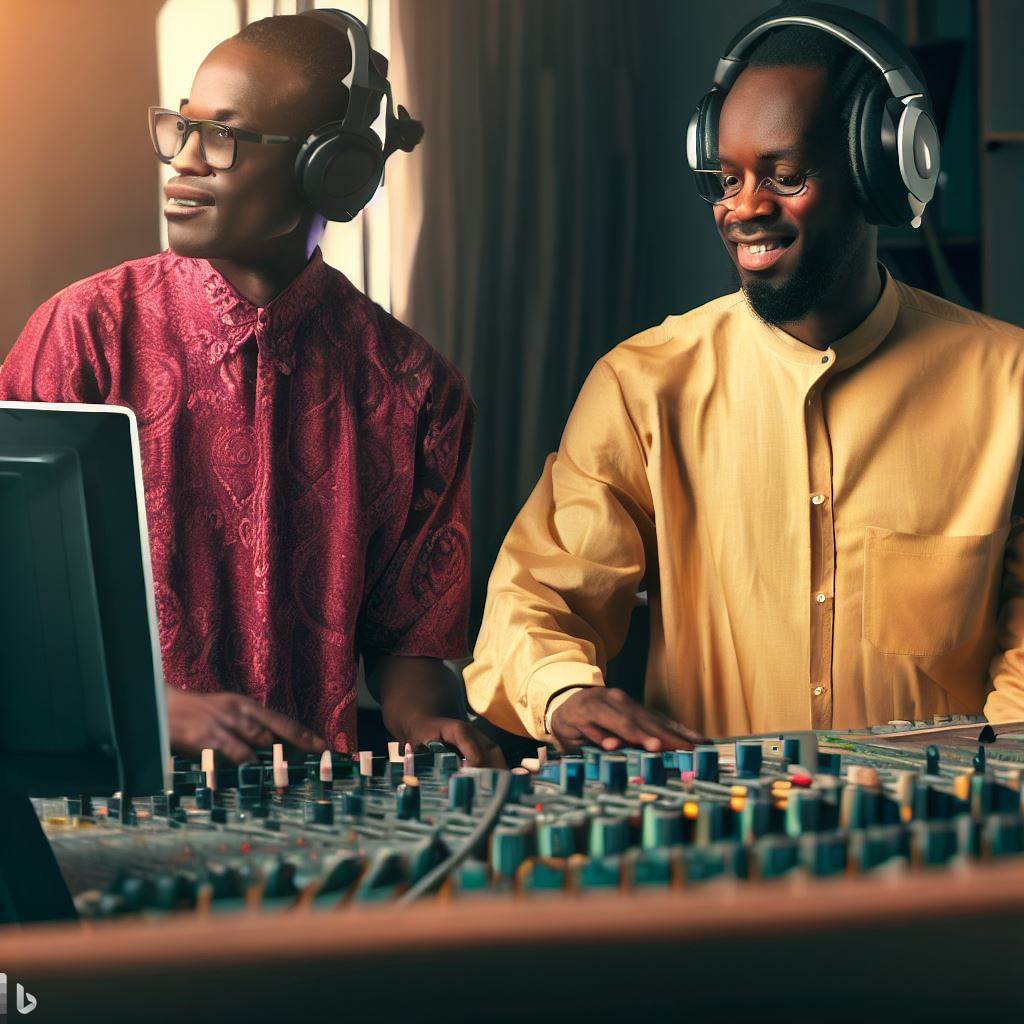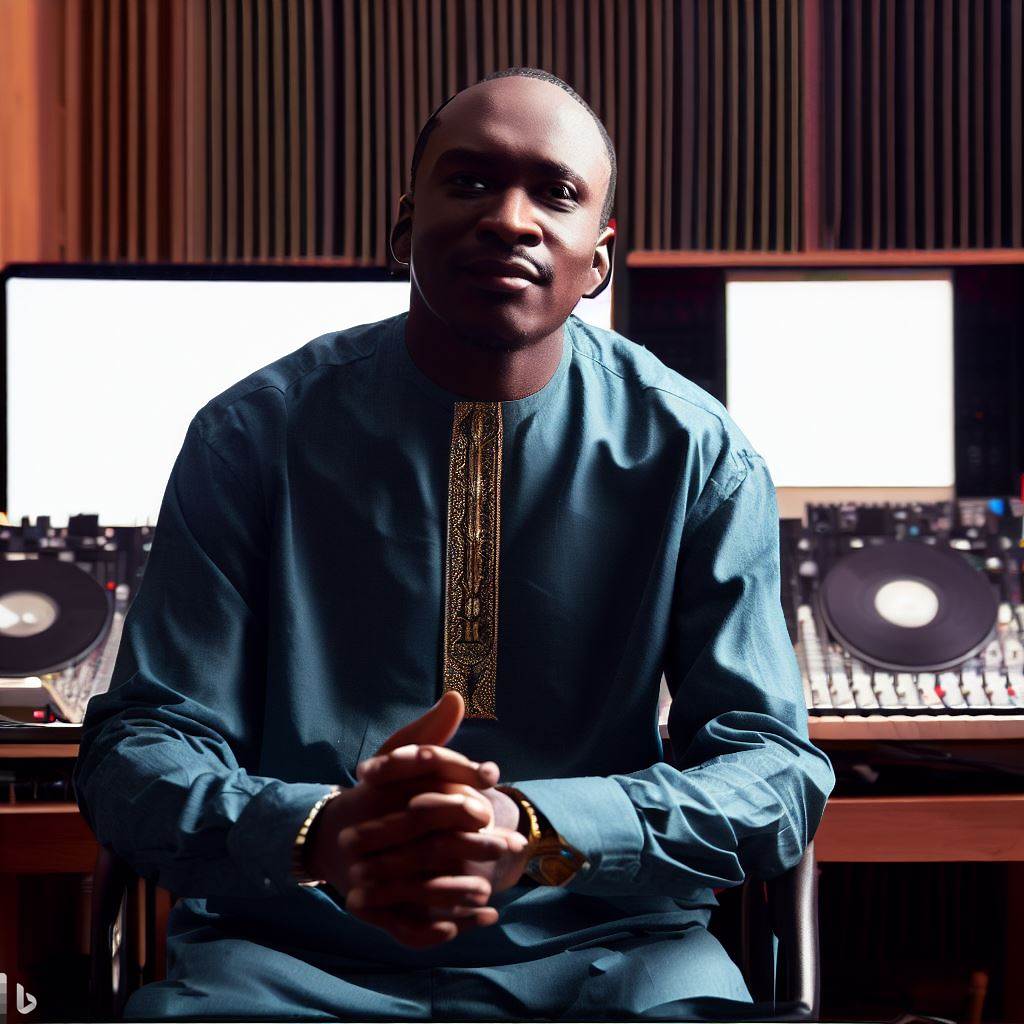Introduction
Music licensing is the process of granting permission for the use of copyrighted music.
It involves obtaining the necessary rights to use a song, composition, or sound recording in various media such as films, TV shows, advertisements, and live performances.
In Nigeria, understanding music licensing is of utmost importance for artists, producers, and anyone involved in the music industry.
By obtaining music licenses, artists and content creators ensure that they comply with copyright laws and protect their intellectual property.
Music licensing also ensures that artists and creators are properly credited for their work and receive compensation for the use of their music. This compensation is usually in the form of royalties or license fees.
In Nigeria, the music industry has witnessed significant growth and plays a vital role in the country’s entertainment sector.
However, the lack of understanding of music licensing can lead to legal issues, loss of income, and exploitation of artists’ work.
Therefore, it is essential for all stakeholders in the Nigerian music industry to have a thorough understanding of music licensing.
Understanding music licensing helps artists protect their creative work, secure a fair income, and gain recognition for their talent.
It also allows content creators to avoid legal troubles and ensure that they are using music legally and responsibly.
Music licensing is a fundamental aspect of the music industry in Nigeria.
It is crucial for artists, producers, and anyone involved in the music industry to have a clear understanding of music licensing to protect their rights, receive fair compensation, and avoid legal issues.
Understanding the Basics of Music Licensing
Music licensing plays a vital role in protecting the rights of creators and ensuring fair compensation for their work. In Nigeria, there are three main types of licenses.
Definition and purpose of music licensing
- Music licensing refers to the process of granting legal permission to use copyrighted music.
- Its purpose is to protect the rights of creators and ensure fair compensation for their work.
Types of licenses in Nigeria
Performance License
A performance license is required whenever music is played in public, be it performed live or recorded. This includes events, music festivals, clubs, and restaurants.
Without a performance license, these establishments cannot legally use copyrighted music.
Transform Your Career in Nigeria
Discover unmatched expertise with our personalized Career Consulting service. Navigate Nigeria’s job market with a strategy tailored just for you.
Get StartedMechanical License
A mechanical license is necessary for reproducing copyrighted music onto physical or digital formats. This includes the production of CDs, streaming services, and digital downloads.
Anyone wishing to use music in these formats must obtain a valid mechanical license.
Synchronization License
A synchronization license is obtained when music is synchronized with visual content, such as in films, TV shows, or advertisements.
Both the music and visual elements require separate synchronization licenses. This ensures that the creators of both components are adequately compensated.
Both licensors and licensees have specific rights and responsibilities throughout the music licensing process.
Rights and responsibilities of the licensor and licensee
Rights and Responsibilities of the Licensor
The licensor holds the exclusive rights to the music and grants licenses for its use.
Their responsibilities include ensuring that licensees adhere to the agreed-upon terms and conditions and receive fair compensation for the licensed use of their music.
Rights and Responsibilities of the Licensee
The licensee must obtain valid licenses to legally use copyrighted music.
They are obligated to adhere to the terms and conditions outlined by the licensor, including timely payment of the agreed-upon fees for the licensed music usage.
Understanding the basics of music licensing in Nigeria is crucial for both creators and users of copyrighted music.
By respecting and following the licensing process, everyone involved can benefit from a fair and thriving music industry.
Read: How Music Publishers are Shaping Nigerian Music
The Process of Music Licensing in Nigeria
In order to license music in Nigeria, there are several important steps that need to be followed.
These steps ensure that the rights of the copyright owner are protected and that the proper licenses are obtained for the use of the music.
Identifying the Copyright Owner
- Determine the rightful owner of the copyright for the music you wish to license.
- Verify the ownership by conducting thorough research and contacting relevant music publishers or copyright societies.
- Obtain the necessary contact information for the copyright owner.
Identifying the copyright owner is crucial before proceeding with any licensing requests to ensure that the correct party is being approached.
Submitting a License Request
- Prepare a detailed license request specifying the intended use of the music.
- Include the duration, medium, territory, and any other relevant information in the license request.
- Send the license request to the copyright owner or their designated representative.
Submitting a comprehensive license request is essential to clearly convey your intentions and avoid any misunderstandings during the licensing process.
Negotiating Licensing Terms
- Engage in negotiation with the copyright owner or their representative to agree on licensing terms.
- Discuss and finalize details such as fees, royalties, duration, and any usage restrictions.
- Ensure that both parties are satisfied with the negotiated licensing terms.
Negotiating licensing terms involves open communication and a willingness to find a mutually beneficial agreement between the licensor and licensee.
Obtaining the License
- Once the licensing terms are agreed upon, obtain a written license agreement.
- Ensure that the license agreement clearly states the rights granted and the obligations of both parties.
- Review the license agreement carefully before signing to ensure compliance with applicable laws and regulations.
Obtaining a written license agreement is crucial as it serves as legal documentation of the rights and permissions granted for the use of the music.
Importance of Documentation and Contracts in Licensing
Proper documentation and contracts are essential in music licensing to protect the rights and interests of all parties involved.
- Maintain records of all licensing agreements, correspondence, and payments made.
- Ensure that contracts are drafted by qualified legal professionals to accurately reflect the agreed-upon terms.
- Keep copies of all signed contracts and related documents for future reference and potential disputes.
By maintaining proper documentation and contracts, both the copyright owner and the licensee can protect themselves and easily resolve any potential issues that may arise.
Licensing music in Nigeria involves a process that includes identifying the copyright owner, submitting a license request, negotiating licensing terms, obtaining the license, and maintaining proper documentation and contracts.
Following this process ensures that the rights of the copyright owner are respected and that the licensee has the necessary permissions to use the music.
Read: Success Stories of Prominent Nigerian Music Publishers
Challenges and Legal Considerations in Music Licensing
Copyright infringement issues
- Copyright infringement is a major challenge in music licensing in Nigeria.
- Artists often face issues of their copyrighted music being used without permission.
- The unauthorized use of music can lead to financial losses and damage to the artist’s reputation.
- Proper licensing and obtaining permission from copyright owners can help prevent infringement issues.
Royalty payments and tracking systems
- Royalty payments are a crucial aspect of music licensing for artists and rights holders.
- The lack of a proper tracking system makes it difficult to ensure accurate royalty payments.
- Technology advancements have made it easier to track the usage of music and calculate royalties.
- Implementing efficient tracking systems can help artists receive proper compensation for their work.
Avoiding scams and illegal licensing activities
- The music industry in Nigeria is plagued by scams and illegal licensing activities.
- Artists must be cautious and aware of fraudulent individuals or organizations offering licensing deals.
- Conducting thorough research and verifying the legitimacy of potential partners can prevent scams.
- Consulting with music industry professionals can provide guidance and help avoid illegal licensing activities.
Importance of seeking legal advice
- Seeking legal advice is crucial when dealing with music licensing in Nigeria.
- Legal professionals specialized in intellectual property rights can provide valuable guidance.
- They can ensure that artists’ rights are protected and that proper licensing agreements are established.
- Legal advice can help artists navigate complex legal requirements and avoid potential legal disputes.
Music licensing in Nigeria presents various challenges and legal considerations that artists should be aware of.
Publish Your Professional Profile, Business or Brand
Showcase your expertise, gain trust, and boost visibility instantly on Professions.ng.
Publish NowCopyright infringement issues can harm artists financially and damage their reputation, emphasizing the need for proper licensing and permission.
Royalty payments and tracking systems play a vital role in ensuring fair compensation, requiring efficient tracking systems to accurately calculate royalties.
Avoiding scams and illegal licensing activities is crucial, necessitating thorough research and consultation with industry professionals.
Lastly, seeking legal advice is of utmost importance to protect artists’ rights and navigate legal requirements effectively.
By understanding and addressing these challenges and legal considerations, artists can maximize their opportunities and protect their intellectual property in the Nigerian music industry.
Read: Legal Aspects of Music Publishing in Nigeria

Maximizing Opportunities with Music Licensing in Nigeria
Understanding the market and target audience
- Research Nigeria’s music market to identify popular genres and emerging trends.
- Understand the preferences and demographics of your target audience in Nigeria.
- Create music that aligns with the cultural context and tastes of Nigerian listeners.
- Adapt your music to suit various media platforms such as radio, TV, and streaming services.
Building relationships with music supervisors and industry professionals
- Attend industry events, conferences, and networking sessions to connect with music supervisors.
- Build rapport by providing high-quality and original music that fits their specific needs.
- Collaborate with industry professionals such as producers, artists, and songwriters to enhance your music.
- Maintain professional relationships and keep them updated with your latest projects.
Showcasing music through reputable platforms and channels
- Utilize online platforms like SoundCloud, YouTube, and social media to share your music.
- Submit your music to reputable Nigerian music blogs, online radio stations, and playlists.
- Ensure your music is easily discoverable and properly tagged on streaming platforms like Spotify and Apple Music.
- Work with music licensing agencies that have established relationships with key industry players.
Staying updated with licensing regulations and trends
- Regularly research and stay informed about music licensing regulations in Nigeria.
- Follow relevant industry publications, blogs, and social media accounts for updates.
- Understand the legal requirements and obtain necessary licenses before using others’ music.
- Stay up to date with emerging licensing trends and new opportunities in the Nigerian music industry.
Leveraging technology and digital platforms for licensing opportunities
- Use digital platforms like MusicGateway, Syncbank, and Songtradr to find licensing opportunities.
- Submit your music to music libraries and sync agencies that cater to Nigerian market needs.
- Explore options for licensing your music for advertisements, films, TV shows, and video games.
- Consider offering different licensing options, such as exclusive or non-exclusive agreements, to maximize revenue streams.
By following these strategies, musicians can maximize opportunities with music licensing in Nigeria, tapping into the country’s vibrant music scene and expanding their reach to a wider audience.
Read: Challenges Facing Music Publishers in Nigeria Today
Find Out More: The Role of PR in Nigeria’s Corporate World
Case Studies and Success Stories in Music Licensing in Nigeria
Success stories of Nigerian artists and composers in licensing
- Burna Boy: Signed a licensing deal with Atlantic Records for international distribution.
- Tiwa Savage: Licensed her song “Ma Lo” for use in a popular TV commercial, boosting her popularity.
- Wizkid: Collaborated with international artists through licensing agreements, expanding his fanbase.
- Yemi Alade: Licensed her hit song “Johnny” for a Hollywood movie, leading to international recognition.
- Osita Osadebe: Posthumously licensed his classic songs for use in Nigerian movies, increasing their cultural impact.
Strategies and approaches taken by successful licensees
- Building strong relationships with music supervisors and producers to increase licensing opportunities.
- Creating diverse catalogues with songs in different genres to cater to various licensing needs.
- Investing in high-quality recordings and productions to enhance the chances of licensing success.
- Collaborating with other artists and composers to create unique and marketable music for licensing.
- Proactively seeking out licensing opportunities through networking and attending industry events.
Examples of unique licensing opportunities in Nigeria
- Licensing traditional Nigerian folk songs for use in documentaries and cultural events.
- Using Nigerian highlife music in commercials promoting traditional Nigerian products.
- Collaborating with Nigerian fashion brands to create exclusive music for their runway shows.
- Licensing Afrobeat tracks for international dance competitions and events.
- Providing music for Nigerian-themed video games to enhance the gaming experience.
These case studies and success stories in music licensing highlight the potential for Nigerian artists and composers to monetize their work and gain international recognition.
Through licensing agreements, artists can not only generate income but also reach new audiences and expand their fanbase.
The success stories of Burna Boy, Tiwa Savage, Wizkid, Yemi Alade, and Osita Osadebe demonstrate the impact licensing can have on an artist’s career.
Licensing their music for international distribution, TV commercials, Hollywood movies, and Nigerian films has elevated their profiles and opened doors to new opportunities.
Successful licensees employ specific strategies and approaches to increase their chances of licensing success.
Building relationships with industry professionals, creating diverse catalogues, investing in high-quality recordings, and seeking out opportunities actively are key factors in their achievements.
Nigeria also offers unique licensing opportunities due to its rich cultural heritage.
Traditional folk songs, highlife music, and Afrobeat tracks have found their place in various mediums, highlighting the diverse applications of licensed music.
Collaborating with fashion brands and video game developers further expands the possibilities for licensing in Nigeria.
Nigerian artists and composers can harness the power of music licensing to not only generate income but also gain exposure and recognition.
By studying successful case studies, adopting effective strategies, and exploring unique licensing opportunities, musicians in Nigeria can make their mark in the global music industry.
Conclusion
In this post, we explored the vital role of music licensing in Nigeria’s music industry.
We discussed how obtaining proper licenses ensures that artists and creators are protected and fairly compensated for their work.
We strongly encourage artists and creators to embrace the world of music licensing in Nigeria.
By doing so, they can tap into new revenue streams and gain exposure through various platforms such as TV, film, and advertising.
Music licensing plays a crucial role in the growth and development of the Nigerian music industry.
Artists and creators should be proactive in learning more about licensing procedures and seeking appropriate representation or licensing agencies.
Additionally, conducting further research on music licensing laws, regulations, and industry trends can enhance their understanding and increase their chances of success.
For more information on music licensing in Nigeria, we recommend exploring resources such as the Nigerian Copyright Commission (NCC) and engaging with industry professionals who specialize in music licensing.
With determination and knowledge, artists and creators can unlock the full potential of music licensing in Nigeria.




